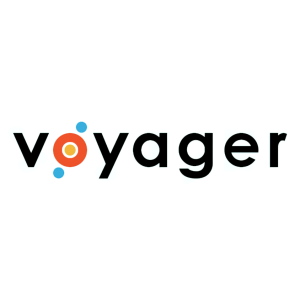Voyager Therapeutics Presents New Preclinical Data Showing Reduction of Pathological Tau with Vectorized Anti-Tau Antibody
Voyager Therapeutics (NASDAQ: VYGR) presented new preclinical data on a vectorized anti-tau antibody at the 24th Annual Meeting of the American Society of Gene and Cell Therapy. The data indicates durable expression within the central nervous system, which may provide a novel single-dose strategy for treating tauopathies like Alzheimer's. Key findings include a 59% reduction in tau pathology after intravenous administration in rodent models and lasting expression for at least 28 days. A virtual investor event is planned for July 2021 to discuss further developments.
- Durable expression of vectorized anti-tau antibody lasting up to 28 days post-administration.
- Achieved up to 59% reduction in tau pathology in rodent tauopathy models.
- None.
Insights
Analyzing...
Findings to be presented at the 24th Annual Meeting of the American Society of Gene and Cell Therapy
Data demonstrate durable expression in CNS and may represent a new single-dose therapeutic strategy for treating various tauopathies
CAMBRIDGE, Mass., May 12, 2021 (GLOBE NEWSWIRE) -- Voyager Therapeutics, Inc. (NASDAQ: VYGR), a clinical-stage gene therapy company focused on developing life-changing treatments for serious neurological diseases today will present new preclinical data characterizing the durable expression and activity of a vectorized anti-tau antibody at the 24th Annual Meeting of the American Society of Gene and Cell Therapy (ASGCT), taking place virtually May 11-14, 2021.
“Tauopathies such as progressive supranuclear palsy, frontal temporal dementia, and Alzheimer’s disease are devastating neurodegenerative disorders, and we believe that our novel vectorized anti-tau antibody approach holds the promise to deliver more therapeutically relevant antibodies directly to critical brain regions associated with disease progression,” said Kelly Bales, Ph.D., Senior Vice President of Neuroscience at Voyager. “By directing CNS-targeted AAV vectors to encode a novel anti-tau monoclonal antibody, our approach has the potential to improve the efficacy and durability of anti-tau immunotherapies.”
Voyager has developed modular antibody vectorization cassettes, which consist of an adeno-associated virus (AAV) vector and a transgene encoding anti-tau monoclonal full-length antibodies. Following intravenous (IV) administration and transduction of target cells in the brain, the expressed antibodies are functionally reconstituted and subsequentially secreted into the parenchyma.
In an oral presentation titled “Efficacy of a Vectorized Anti-Tau Antibody Using Systemic Dosing of a Blood Brain Penetrant AAV Capsid in Mouse Models of Tauopathies,” (Abstract #105), Principal Scientist Wencheng Liu, Ph.D., will present data demonstrating promoter-driven, cell-specific expression of a vectorized anti-tau antibody and efficacy in multiple tauopathy mouse models.
- Anti-tau antibody expression was detected as early as 2 days post-dose, reaching maximum levels at day 7, with durable expression extending to 28 days following IV administration of vectorized anti-tau antibody to rodents.
- Dose-dependent decreases in the levels of pathological tau and neurofibrillary tangles were observed following IV administration of a vectorized anti-tau antibody to a rodent tauopathy model, resulting in up to
59% reduction in tau pathology.
The company will host a virtual investor and analyst event in July, 2021 to share more about its novel TRACER™ capsids, its anti-tau vectorized antibody program, and other pipeline and platform developments.
About Voyager Therapeutics
Voyager Therapeutics is a clinical-stage gene therapy company focused on developing life-changing treatments for serious neurological diseases. Voyager is committed to advancing the field of AAV gene therapy through innovation and investment in vector engineering and optimization, manufacturing, and dosing and delivery techniques. For more information on Voyager Therapeutics, please visit the company’s website at www.voyagertherapeutics.com or follow @VoyagerTx on Twitter and LinkedIn.
Voyager Therapeutics® is a registered trademark, and TRACER™ is a trademark, of Voyager Therapeutics, Inc.
Forward-Looking Statements
This press release contains forward-looking statements for the purposes of the safe harbor provisions under The Private Securities Litigation Reform Act of 1995 and other federal securities laws. The use of words such as “may,” “might,” “will,” “would,” “should,” “expect,” “plan,” “anticipate,” “believe,” “estimate,” “undoubtedly,” “project,” “intend,” “future,” “potential,” or “continue,” and other similar expressions are intended to identify forward-looking statements. For example, all statements Voyager makes regarding anti-tau immunotherapy as a promising therapeutic approach; the potential ability of anti-tau immunotherapy to address multiple CNS diseases; and potential ability of anti-tau immunotherapy to improve the effectiveness of antibody immunotherapy are forward looking.
All forward-looking statements are based on estimates and assumptions by Voyager’s management that, although Voyager believes such forward-looking statements to be reasonable, are inherently uncertain. All forward-looking statements are subject to risks and uncertainties that may cause actual results to differ materially from those that Voyager expected. Such risks and uncertainties include, among others the severity and length of the COVID-19 health crisis; the initiation and conduct of preclinical studies involving our vectorized anti-tau antibody program; the continued development of Voyager’s gene therapy platform and Voyager’s TRACER system; the applicability of novel capsids identified by the TRACER system to the vectorized anti-tau antibody program; Voyager’s scientific approach and general development progress; the ability to attract and retain highly skilled and experienced scientists and technicians; the ability to create and protect intellectual property related to Voyager’s vectorized anti-tau antibody program and development of novel capsids; and the availability of resources necessary to conduct the gene therapy development programs, including access to sufficient number and types of primates suitable for participation in ongoing and planned preclinical research activities.
These statements are also subject to a number of material risks and uncertainties that are described in Voyager’s Annual Report on Form 10-K for the year ended December 31, 2020 filed with the Securities and Exchange Commission, as updated by its subsequent filings with the Securities and Exchange Commission. All information in the press release is as of the date of this press release, and any forward-looking statement speaks only as of the date on which it was made. Voyager undertakes no obligation to publicly update or revise this information or any forward-looking statement, whether as a result of new information, future events or otherwise, except as required by law.
Investor Inquiries:
investors@voyagertherapeutics.com
Media Inquiries:
Lissette Steele
Verge Scientific Communications
202.930.4762 x 409
lsteele@vergescientific.com







